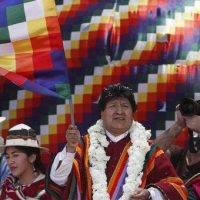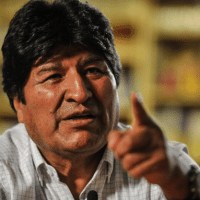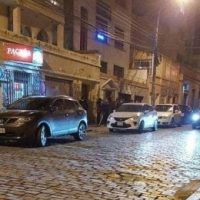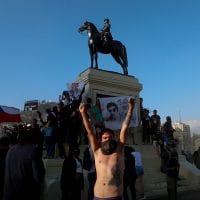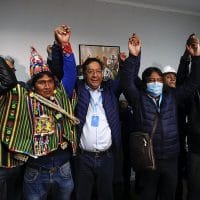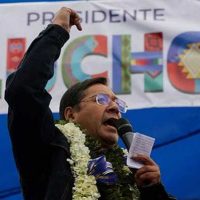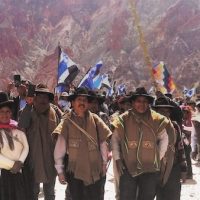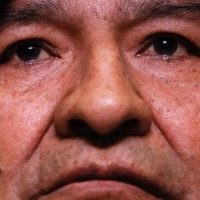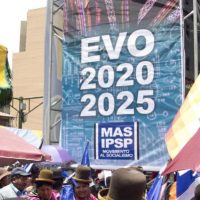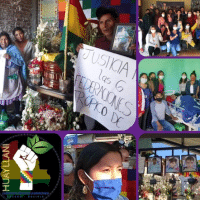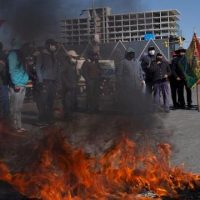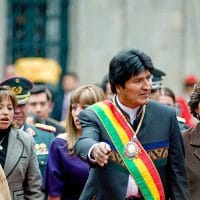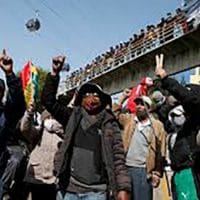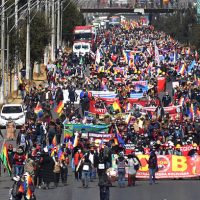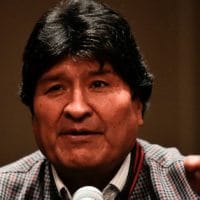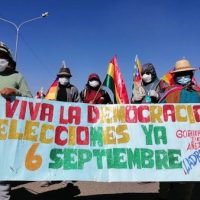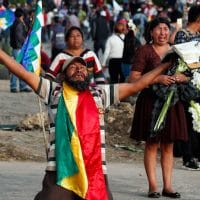-
Evo Morales: Lithium was the reason for the coup in Bolivia
The former president of Bolivia, Evo Morales, assures that the large deposits of lithium in the Andean country and his government’s attempt to industrialize the reserves were why the coup d’état against him in 2019 occurred.
-
Evo Morales’ sarcasm: “If there was fraud, Donald Trump should go to OAS’s Luis Almagro”
In one of his last interviews before traveling to Bolivia—the return to his homeland is scheduled for November 9—Evo Morales stated his opinion on the United States elections, where there is still no confirmation on who will be the next president.
-
Bolivia Bolivia’s President-Elect Luis Arce attacked with dynamite
The Socialist leader was attacked while he was at a meeting in La Paz city. There is no report of injuries.
-
We Are That History That Is Discredited, but Which Reappears When You Least Expect It
The coup followed an election that would have resulted in Morales’ fourth term as president, the results of which were questioned by the Organisation of American States or OAS (60% of whose funding comes from the U.S. government).
-
In stunning display of popular will, protests in Bolivia to Chile force public reckoning of “Chicago Boy” economics
Like in Bolivia, the strength of public opinion in Chile was so immense that the government, led by Chile’s richest man Sebastian Piñera, immediately conceded.
-
The Bolivian right: Divided, without leadership
here are still days of uncertainty until the new government is in office. What happened in Bolivia can be described as a counter-coup, in the face of a coup with strong international support that had not arrived to remain only one year in political power.
-
MAS election victory in Bolivia generates wide repercussion
The victory in first round of the Movement towards Socialism (MAS) party in Bolivia, according to an exit poll, has generated several reactions on Monday after surpassing what was expected in the polls.
-
Hours before Bolivia goes the polls, early results system suspended, military mobilization in La Paz
The first elections since the coup d’état will be held on October 18 amid a tense social and political climate. This includes a military mobilization in La Paz the night before the polls and the suspension of the DIREPRE early results system.
-
Bolivia Court denies Evo Morales candidacy for October 18 elections
“History shows that they will be able to disqualify Evo, but they will not be able to outlaw the people,” Evo Morales replied as he urged Bolivians no to “fall into any provocation,” instead “abide by that decision because our commitment and priority is for the people to come out of the crisis.”
-
Why U.S. political scientists are arguing that Evo Morales should be the President of Bolivia
Three political scientists from the United States closely studied allegations of fraud in the Bolivian election of 2019 and found that there was no fraud. These scholars—from the University of Pennsylvania and Tulane University—looked at raw evidence from the Bolivian election authorities that had been handed over to the New York Times.
-
Bolivia mass mobilizations against U.S.-backed coup continue
A 12-day national Bolivian blockade led by massive social movements, students, elders, unions and farmworkers ended on Aug. 13. It had paralyzed the entire country, resulting in food/fuel shortages and in the complete instability of the Andean nation itself.
-
Añez intensifies persecution of social leaders
Those who took part in the protests against the postponement of the elections are accused of terrorism and sedition.
-
Bolivia’s right-wing coup government is facing resistance
On 28 July, tens of thousands took to the streets of El Alto, the predominantly working-class and Indigenous city that overlooks La Paz, in a mobilisation called by the Bolivian Workers Centre (Central Obrera Boliviana, or COB), the country’s chief trade union federation, together with other worker, peasant and Indigenous organisations (gathered under the title of the “Pact of Unity”) to demand the TSE hold a general election on 6 September.
-
Will there ever be elections again in Bolivia?
On November 10, 2019, President Evo Morales Ayma of Bolivia announced his resignation from the presidency. Morales had been elected in 2014 to a third presidential term, which should have lasted until January 2020.
-
Critical hours in Bolivia
These are critical hours in Bolivia. The protests have been going on nationally for more than a week; the de facto government has deployed police, military and armed civilian groups. The escalation has not ceased and the demand for Jeanine Áñez’s resignation has been established, but what will be the consequences?
-
Bolivia’s perfect storm: Pandemic, economic crisis, repressive coup regime
The rising toll of diseased and deceased from the COVID-19 pandemic has hit Bolivia particularly hard, in a continent that is now in the lead in global contagion rates.
-
Evo Morales denounces latest coup plot, warns of an immanent massacre
Last minute information, I denounce that General Ivan Ortiz Bravo, head of the third department of the Armed Forces Command, on the instruction of the commander in chief of the Armed Forces, General (Sergio Carlos Orellana), has a coup d’état plan. – Former Bolivian president Evo Morales Ayma
-
Bolivia begins the week with an indefinite general strike and roadblocks
In the early hours of this Monday morning, the indefinite general strike and roadblocks began throughout Bolivia, called by the Central Obrera Boliviana (COB) and the organizations that constitute the Unity Pact, which demand that the Supreme Electoral Tribunal respect the election date established by law for September 6.
-
‘We will coup whoever we want’: Elon Musk and the overthrow of democracy in Bolivia
Protests across Bolivia began on July 27 for the restoration of democracy.
-
Twitter targets accounts of MintPress and other outlets covering unrest in Bolivia
MintPress News, along with a number of independent Bolivian news outlets and journalists covering the unrest there, were all targeted for suspension at the same time.

